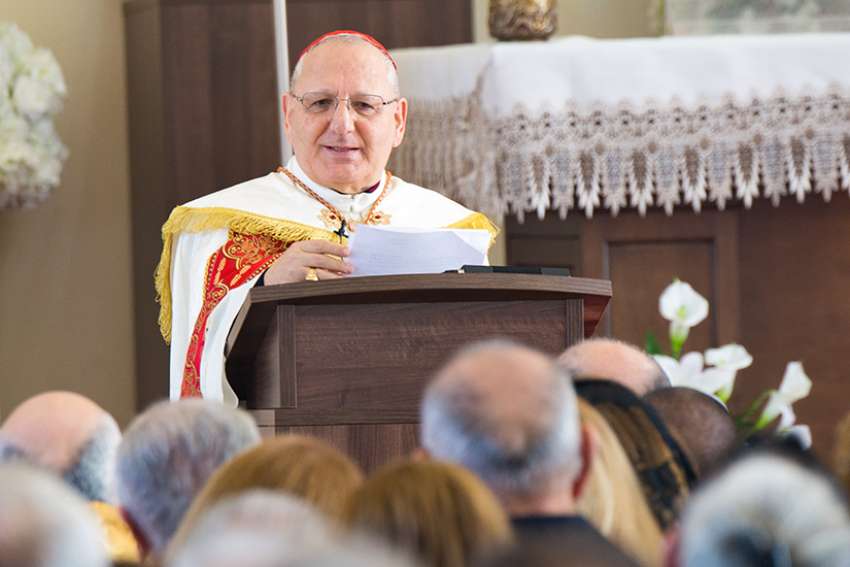But it’s a whole new ball game for Chaldeans, which is why appointing Chaldean Patriarch Louis Raphael Sako to the College of Cardinals on May 20 is particularly significant, the Chaldean bishop of Canada told The Catholic Register.
“Sixty, 70, 80 per cent of Chaldeans now live outside their historical territories. We are already a Western Church,” said Bishop Bawai Soro. “We really don’t know what we are now. Having a cardinal among us — a young one… Sako will be very active. Already he is active. He will use his credentials, I think, for the good of the Church.”
As Patriarch of Babylon, Sako is to Chaldean Catholics what the Pope is to Roman Catholics — the final arbiter and guarantor of unity among Chaldean bishops. It’s not unprecedented that a patriarch of an Eastern rite should be appointed to the body of electors for the patriarch of the Western or Roman rite. But it does acknowledge that the Church has an interest in the survival of all its traditions and cultures.
“He (Sako) has a leg in both worlds. He is an easterner, but who has trained in the West. He is a very acceptable link between the two worlds,” said Soro. “I think the Holy See recognizes that.”
Sako, 69, leads one of the most aggrieved, persecuted and oppressed corners of the Christian world. Since the American invasion of Iraq in 2003 about one million Iraqi Christians, the majority of them Chaldeans, have left Iraq. While it is tempting to blame the post-invasion chaos and the rise of the Islamic State, in fact the Chaldean world has been unstable and threatened since the fall of the Ottoman Empire at the end of the First World War.
“After World War II, the Eastern patriarchates (Chaldean Catholic, Syriac Catholic and others) do not live in their traditional geographical territories anymore,” said Soro. “Immigration, persecution, the rise of nationalism, the rise of human rights, the rise of fundamentalism, the fall of the Soviet Union — all of these world events triggered an emigration of Eastern Christians.”
There were fewer than 9,000 Canadian Chaldeans in 2006. By the time Pope Benedict XVI formed the Mar Addai Catholic Eparchy for Canada in 2011 there were over 13,000. In the 2016 census over 46,000 identified themselves as Chaldean or Assyrian.
Since elected patriarch in 2013, Sako has broken the mould for Eastern Church leadership. Faced with extraordinary pressures and rapid political and cultural change, Sako refused to play the role of political broker and protector for Iraq’s dwindling and threatened Chaldeans. Instead, he has promoted the idea of common Iraqi citizenship separate from religious affiliation.
Prior to May 12 elections, Sako warned people off of certain Christian candidates for the Iraqi parliament because they were in fact pawns of powerful Kurdish and Shiite political parties. Rather than trying to cut a deal for narrow concessions to the Christian population, voting should be about building a democratic state for the benefit of all Iraqis, Sako said.
In January Sako was nominated for the 2018 Nobel Peace Prize by the French Catholic association L’Oeuvre d’Orient for his efforts to encourage a democratic, secular and peaceful Iraq.
Sako has also been an advocate of liturgical reforms and a deeper catechesis within his own Church, recognizing that Chaldean-Aramaic is no longer the first language for the majority of Chaldeans.
“He defends the survival of his tradition by upgrading it,” said Soro. “By developing it, by making it relevant to the present mentality in a format that is more understood, used and relevant today.”
For Canadian Chaldeans, a Chaldean voice in the College of Cardinals is an occasion for joy and pride, said Soro. It also fits in with Soro’s own plans to be a full participant in the Canadian Conference of Catholic Bishops and to co-ordinate with Roman rite dioceses across Canada.
“It (appointment to the College of Cardinals) is not for me, but for the Church, which has suffered so much, and for Iraq,” Sako told Vatican News in Italian.
Sako is one of 14 new cardinals who will be welcomed into the college in Rome on June 29, and one of 11 under the age of 80. With these additions, Pope Francis has now appointed 59 cardinal-electors, 47 per cent of the total. Another 10 cardinals will turn 80 next year, allowing the Pope to make further appointments.
With appointments from Japan, Madagascar, Pakistan and Iraq, the heavy European contingent in the College of Cardinals is shrinking, though they still constitute 42 per cent of cardinal-electors.
Chaldeans take big step into global spotlight with new cardinal
By Michael Swan, The Catholic RegisterRoman Catholics are used to belonging to a global church, one that transcends borders, encompasses cultures and finds expression in all the languages of the world.
Please support The Catholic Register
Unlike many media companies, The Catholic Register has never charged readers for access to the news and information on our website. We want to keep our award-winning journalism as widely available as possible. But we need your help.
For more than 125 years, The Register has been a trusted source of faith-based journalism. By making even a small donation you help ensure our future as an important voice in the Catholic Church. If you support the mission of Catholic journalism, please donate today. Thank you.
DONATE

